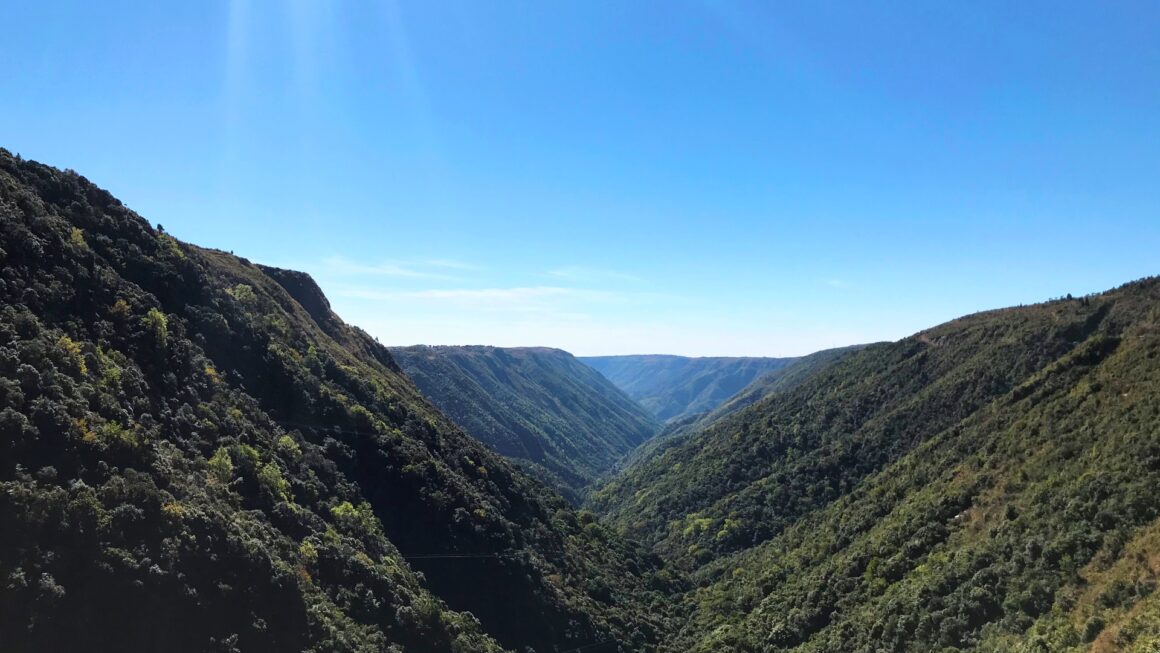The path was less than two feet wide. Jagged, shifty, discouraging. On one side were the forbidding hills; densely covered in trees, giant cobwebs and thorny bushes. On the other, was a green abysmal valley, with Sisyphean boulders and gushing tributaries.
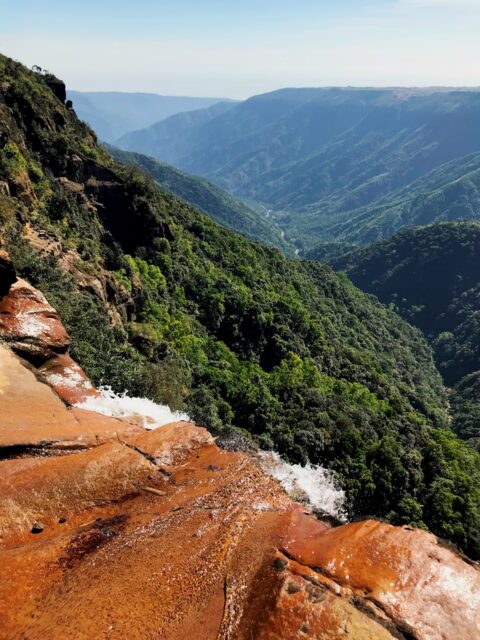
There was nothing to grip onto, really. It was deafeningly quiet, barring the occasional sounds of the forest and ‘Spooky Tales of the Unseen Hill Creatures’ by Robi, our local guide.
There was something peculiar, that lingered throughout the Tyrna trail and pretty much throughout the Khasi hills of Meghalaya – the scent of the forest. It didn’t smell characteristically leafy, or damp.
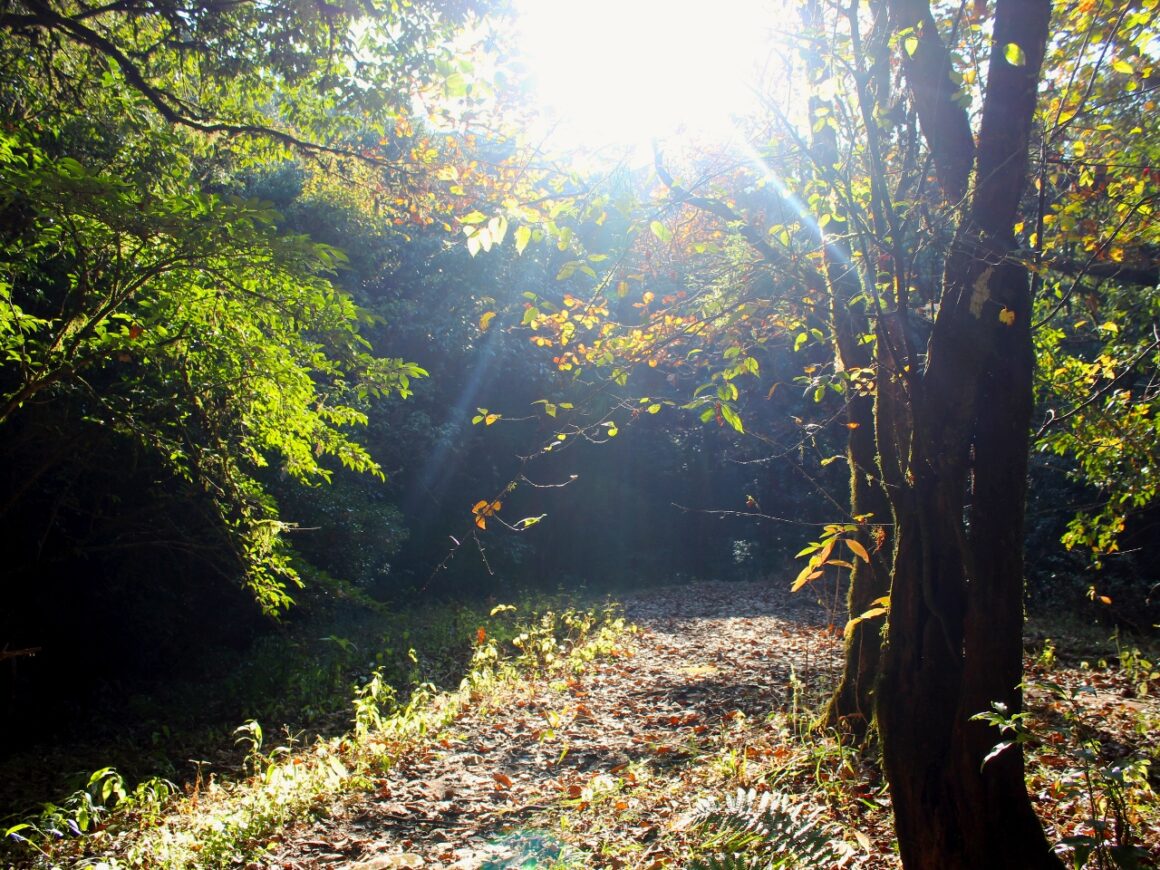
It was strikingly aromatic. Musky, earthy, woody. Gusts of fragrance striking us whenever we paused to catch a breath.
“It smells like some masala,” I muttered, trying to identify the spice, distracting myself from the increasingly narrowing path tilting me toward the voided valley. I grabbed a loose, muddy chunk of the hill, which detached itself and came into my hands, sending me off-balance.
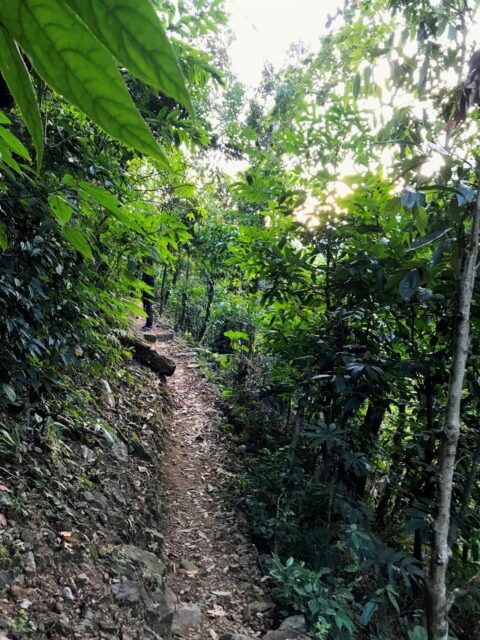
Clinging onto dear life and attempting to determine what the forest smells like is an unnecessary experience. Especially if you have no penchant or talent for adventure. Not even if you’re in search of some sort of profound inspiration for a story.
Robi skittered ahead, swaggering in his flip-flops, scaling the hills without any gear. He casually leaped onto a colossal rock at the bottom of the Rainbow fall (the end of our trek) and lit a bidi. He stood there smoking meditatively, indulging in the thrill of recklessness.
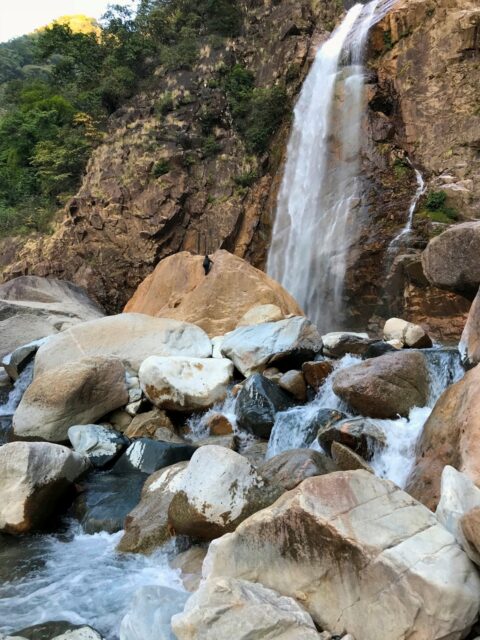
On our way back to the village, we stopped by a creek to fill up our water bottles and rest.
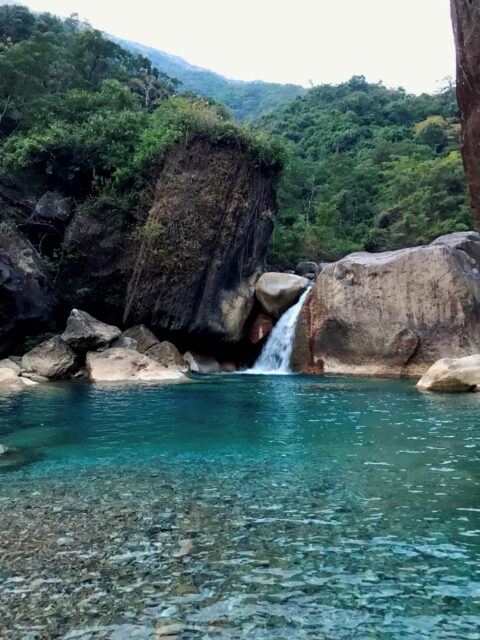
I looked up. Lurking above the bosky forest, the 5 pm sky had turned inky, speckled with a jillion sparkling stars. The valley was now almost invisible. Far off, on the hill across the river, clusters of lights appeared at tuck shops and hill cabins.
When you’re navigating through forested hills, all your senses are nervously heightened. Your eyes are attempting to peel through the suspenseful surroundings, your ears are wary, expecting danger. Even so, I breathed consciously into the stillness, trying to deduce the familiar flavour.
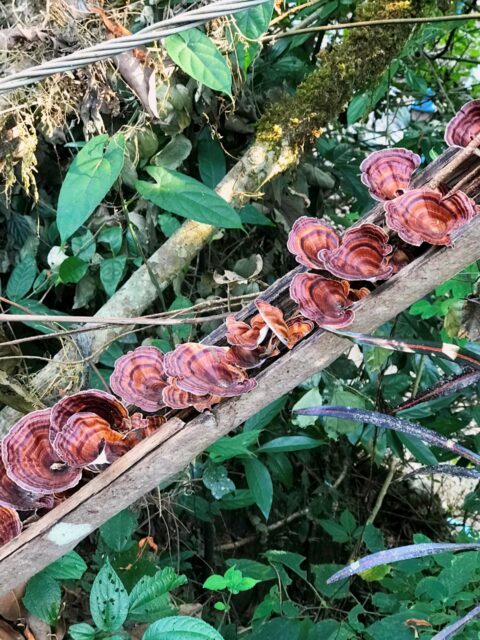
Robi, who had been observing us sniffing and struggling to identify some plants on the trail, clambered up a tree. Then, he jogged ahead, scoured through some fallen leaves, went further ahead and vanished for what seemed like an eternity but was probably five minutes. He returned with a handful of things.
Spices!
“Sla Tyrpad (Bay Leaf). Use for flavour in rice, meat. In chai, good for blood pressure, diabetes.”
“Dalchini (Cinnamon). We add the powder in tea, coffee, cake, meat. Mix little (cinnamon) oil in water… wash mouth, very good for teeth pain, cavities. We also sell (the oil) for perfume, soap, medicine. This one is different, darker and tough. Stronger taste than the other sweet one and more oil also.”
“Sohmrit Khlaw (Wild Indian long pepper). Powder dry seeds (of the wild pepper) mixed with honey and egg yolk. Very good for too much cough.”
He offhandedly divulged bits and pieces of information. Exhibits of the forest in his palm.
“All these we find in the Khasi jungles and we also grow for business in the forest gardens.”
Robi spoke mostly in words, not sentences. Unless he felt particularly excited about something. The fragrant forest trail was a routine affair for him. He didn’t think of it as something that would interest trekkers.
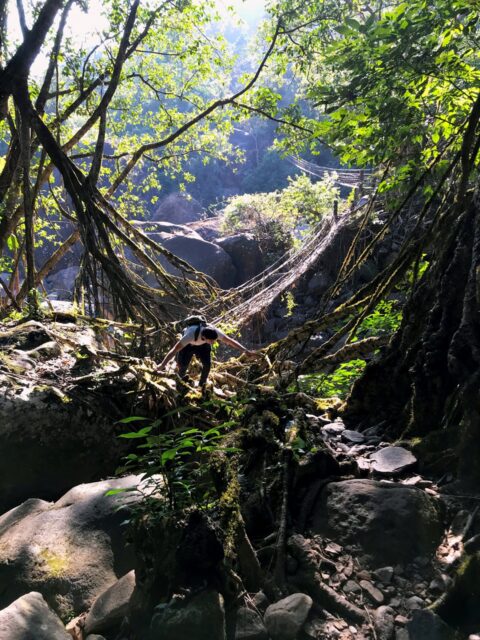
What he did find necessary to reveal in a theatrical, eerie voice, was the legend of the ‘nongshonoh’. The ‘nongshonoh’ – so the story goes – are ‘dark magicians’ appointed by a clan of people known as the ‘Nongri Thlen’ to make a ‘human sacrifice’. The human blood is said to be offered to a satanic serpent called ‘U Thlen’. All for the purported aim to become wealthy.
“They bang doors and take children. They kidnap people from the jungle. Walk fast and keep eyes open.”
We hastened our pace, trying to find firm ground in the blackness, as Robi kept warning us to stay alert and hurry back before the night bared its perils.
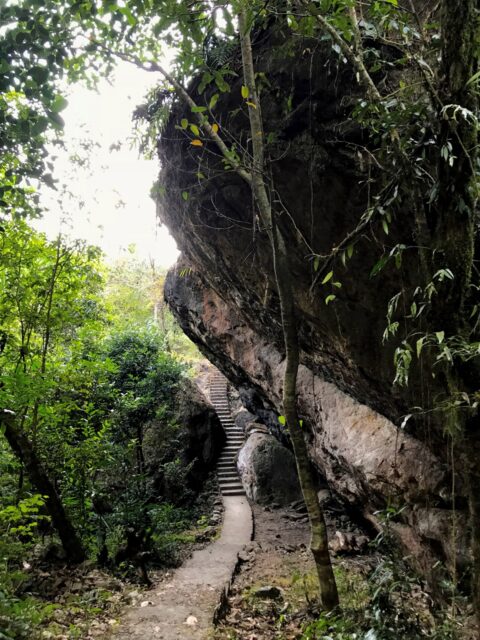
It started to feel like he created this sensational experience only to feed off his audience’s trepidation. He seemed pleased to have quite adequately spiced up our safari.
What was an ambitious 5-hour trek for us, was routine for the many locals who lived in the villages of Tyrna, Nongriat and beyond. At sundown, natives were returning from the Sohra bazaar carrying merchandise in the khoh (conical bamboo baskets, secured with a strap around the head; used as carryalls), some lumbering, reeking of ka kiat (local liquor) and kwai (betel leaf, betel nut and tobacco).
Unimpressed by our quest for common spices over a bloodthirsty demonic serpent, Robi suggested we visit the Sohra Bazaar and one ‘Bei’ (mother) near the Nohkalikai falls the following day.
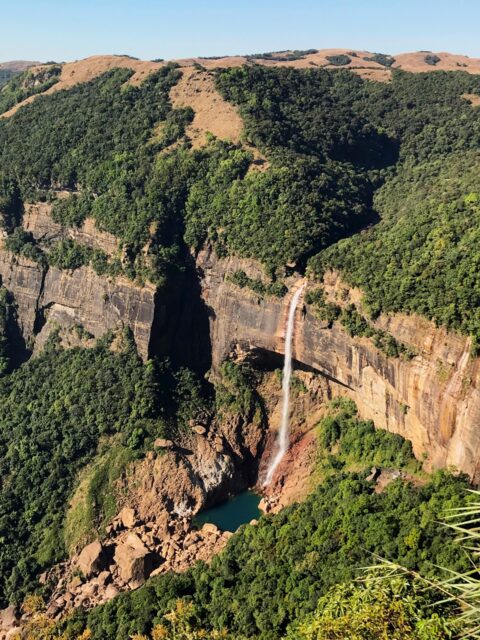
Bei sits at the entryway of the Nohkalikai falls. Perched in front of her, on a low-lying table were some aromatics she had foraged from the forest – bundles of cinnamon sticks, packets of bay leaf and some bottles of cinnamon leaf oil.
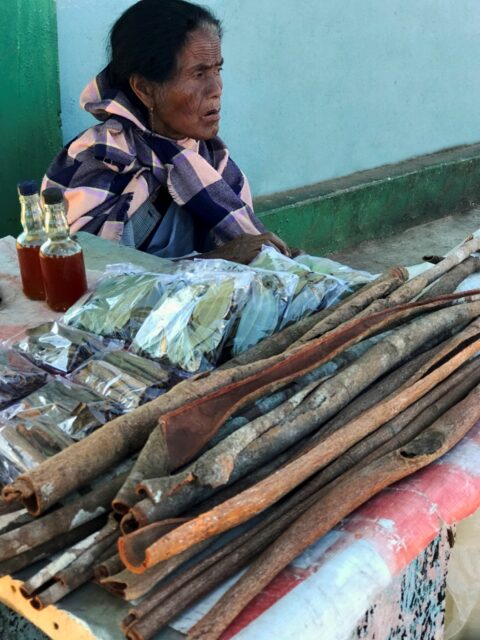
Dressed in a Welsh tartan coat over a saree, she pointed at one bundle of cinnamon and held up her hands to depict the ring gesture, informing us of the top quality of cinnamon on the table. She didn’t speak, partly because she was chewing kwai and mostly because she didn’t feel the need to.
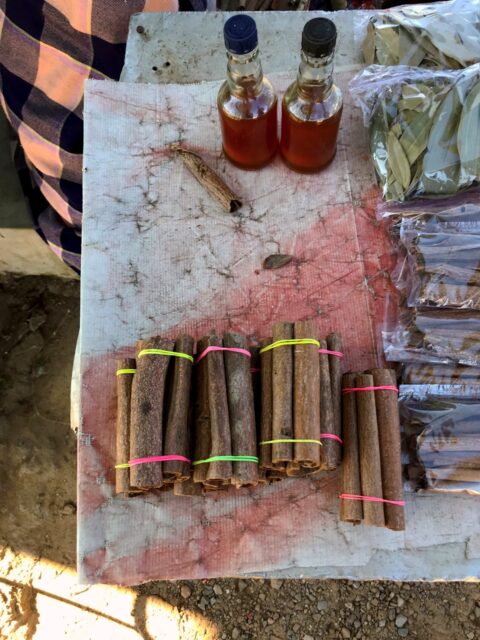
We picked up some cinnamon and went over to the Sohra bazaar.
Since Sohra has one of the heaviest rainfalls in the world, everyone in the market had a kunup on (traditional blue and green tarpaulin like raincoats).
There were many beis, synchronously chewing kwai, also wearing Welsh tartan coats or shawls underneath the kunups – a fashionable consequence perhaps, of the Welsh Presbyterians who converted the Khasis to Christianity during the British rule in India.
The bazaar was a dramatic motley of fresh rain-washed produce. Lakadong turmeric (said to be the world’s best turmeric, found only in Meghalaya), cinnamon, ing makhir (wild ginger), wild pepper, bay leaf, Khasi oranges and whatnot. All stuffed in khohs which doubled up as selling counters and shipment bushels, always ready to move.
Just in case it started to rain. Or, if the sun went down and, perish the thought, the ‘Nongshonoh’ came seeking?
As merchants started winding up and leaving for the day, we heard someone whisper, “walk fast, and keep eyes open.”
Translations and detailed descriptions are provided to give a better understanding of the story to people from different cultural backgrounds across the globe.

